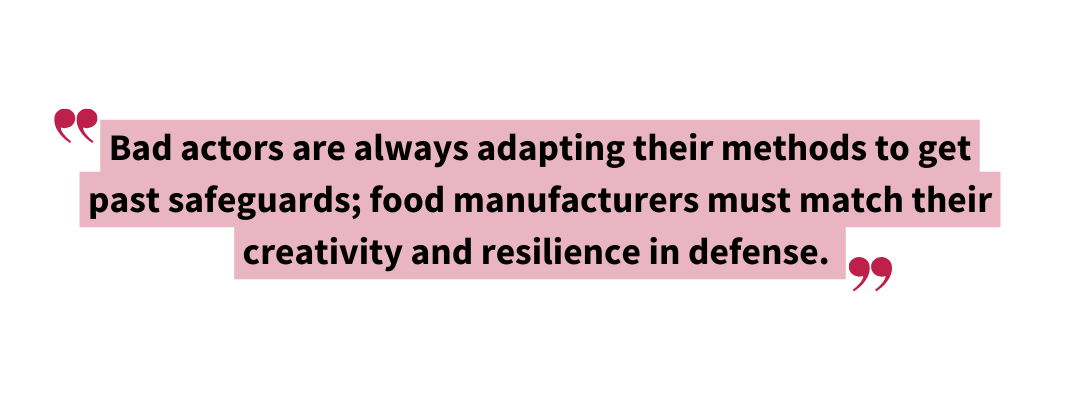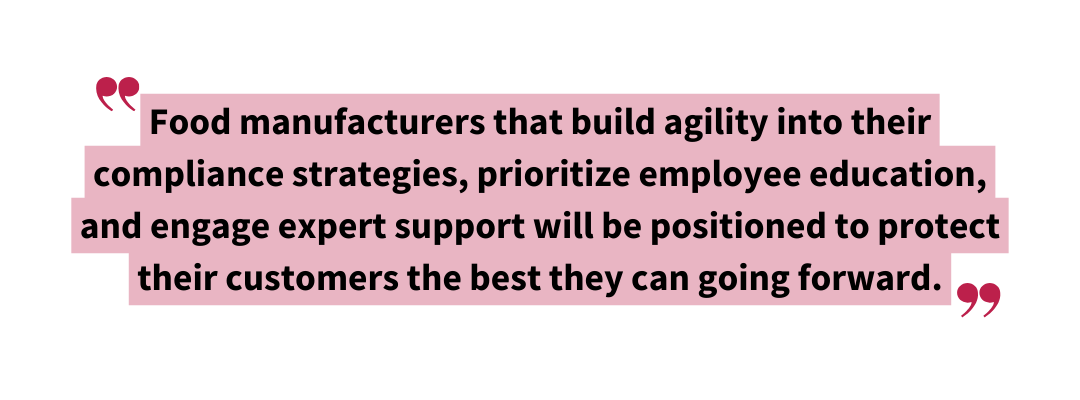Accelerating Compliance: Adapting to the 2025 Food Safety Legislation Landscape
Organizations across the food industry face intensified regulatory requirements in the coming year. Companies that don’t plan for these changes will likely struggle with compliance issues, fees, and slower production.
These evolving expectations, marked by updates to regulations like the Food Defense Rule and the Food Safety Modernization Act (FSMA), will require companies to move faster, think quicker, and boost their training regimens to keep up.
Here’s a look at the critical food safety legislation updates on the horizon, and steps to incorporate agile compliance measures into your food safety strategy to address them.
Food Safety Legislation Changes to Expect in 2025
Here are a few of the most critical legislation changes in the coming year:

Enforcement of the Food Defense Rule
The Food Defense Rule, designed to protect the food supply against intentional food adulteration, emphasizes vulnerability assessment and mitigation strategies. To comply, companies must demonstrate their capacity to prevent acts intended to cause widespread harm (whether driven by sabotage, terrorism, or economic disruption).
In years past, the Food Defense Rule has operated with a number of caveats, as the FDA held off on full enforcement until late in 2024. The interim "FDA Food Defense Quick Checks" were abridged versions that focused on educating manufacturers on the new rule. Beginning in September of 2024, however, the FDA has said they will begin performing detailed inspections of food manufacturers across the spectrum. As of December 2nd, 2024, 10 such full inspections have occurred, or about three per month.
With stricter food safety legislation enforcement expected in 2025, food manufacturers must step up mitigation strategies that limit contamination opportunities at every point in the supply chain.
Why it’s challenging: Creating and implementing security measures for both internal and external threats takes constant vigilance. Bad actors are always adapting their methods to get past safeguards; food manufacturers must match their creativity and resilience in defense.
Additionally, small and medium-sized organizations may struggle to keep up with the training and tech required to adhere to the regulation because of limited resources.
How manufacturers can prepare:
- Vulnerability assessment: Identify potential access points and risks at each stage of production and/or distribution.
- Mitigation Strategies: Secure sensitive areas, bolster access control, and train employees to identify suspicious activity.
- Create/update your food defense plan: Your plan should outline each control measure, define who’s responsible for that measure (with redundancies in place wherever possible), and schedule frequent reviews.
Enhanced Traceability Requirements
The FDA’s Food Traceability Final Rule is also raising traceability standards. These standards affect all facilities that manufacture, process, or handle food on the FDA’s Food Traceability List (FTL).
Organizations must capture specific key data elements (KDEs) for critical tracking events (CTEs), ensuring detailed record-keeping across the supply chain.
Why it’s challenging: Complying with traceability standards at the level required takes significant tech investment and workforce adaptation. Distributors may need more staff (or more efficient systems) to manage the firehose of data that comes with enhanced tracking of traceability if they want to keep accurate records.
How manufacturers can prepare:
- Invest in digital solutions: New software systems designed to track lot codes, shipments, and CTEs can streamline record-keeping.
- Establish clear communication with suppliers: Capture KDEs consistently and coordinate protocols across the supply chain.
- Train employees on new requirements: Keeping up with traceability on a large scale will require more, better trained employees. Implement comprehensive training programs to familiarize employees with updated practices and protocols.

From Deadline-Driven to Daily Diligence
As food safety standards evolve and food safety legislation increases, businesses must view compliance as an ongoing commitment that requires continuous adaptation.
Food manufacturers that build agility into their compliance strategies, prioritize employee education, and engage expert support will be positioned to protect their customers the best they can going forward.
AIB International supports food and beverage companies worldwide by providing expert training, certification, and consulting services to help maintain high standards in food safety and regulatory compliance. Consider reaching out to AIB International for our Assign an Expert service to strengthen your company’s food safety framework in 2025 and beyond.


